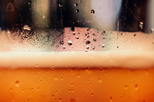Trigger Warning: The following article mentions suicide. Proceed with caution. If you feel you are at risk and need help, skip the story and get help now. Options include: Calling the U.S. National Suicide Prevention Hotline at 800-273-TALK (8255), calling 911, and calling a friend or family member to stay with you until emergency medical personnel arrive to help you.
The link between alcohol abuse and suicide is unquestionably real. According to studies, alcohol is involved in more than a quarter of the suicides that take place in the United States—that’s 7,500 each year. And there are more happening all the time, both in everyday life and also with more and more celebrities who can’t seem to handle the pressures of fame and success.
Why is this? A large part of the reason alcoholics have more of a tendency to commit suicide or engage in reckless behavior is the impulsivity factor. Alcohol is a depressant that causes irrational thinking. When we drink, a host of emotional problems can arise. Negative thoughts, impulsive decisions, and depression become much stronger than they would without the influence of alcohol. It is known that a large number of suicide attempts happen during binge drinking episodes.
Alcohol can make problems seem much larger and more real while under the influence, leading users to believe that they have no way out, or that suicide is the only answer. An alcoholic’s ability to reason is severely impaired, especially during a binge episode. Thoughts are distorted and consequences are not thought through. The normal, inhibited thoughts that would stop most people from harming themselves or making a risky decision are decreased while under the influence of alcohol.
Risk Factors
Some risk factors that can aggravate alcohol use and suicidal thoughts are problems with work, relationships, and finances. Divorce and death can bring on stress, as can financial problems and unemployment. A family history of alcoholism and/or a history of trauma or abuse can all contribute to risk factors for alcohol-induced suicide attempts. In addition, previously undiagnosed mental illnesses can put a burden on those who also engage in heavy alcohol consumption. Alcohol abuse is highly linked to depression, which is one of the major components of suicidal ideation.
Suicidal thoughts are accompanied by feelings of hopelessness—being trapped in depression no matter what you do. The will to live is ceased and the desire to fight is lessened. Depression sets in, happiness seems unattainable, and the outlook is bleak. Add alcohol to the mix, and this becomes a dangerous combination. And the numbers keep going up—an alcoholic is 120 times more likely to commit suicide than a non-alcoholic. Alcohol causes users to think in an irrational manner, and that’s why so many suicides occur under the influence.
Professional Help
Many of those struggling with alcohol abuse do very well with treatment in a rehab center. Rehabs allow the user to stay safe, both from the alcohol and from themselves, until they can get back on their feet and live a healthier lifestyle. Treatment centers are equipped to handle alcohol abuse and those who are feeling suicidal by giving them the care they deserve, with knowledgeable professionals who know exactly what they’re going through.
|
If you or someone you know may be at risk for suicide, seek help immediately. You are not alone. Options include:
|
|
If you or someone you know is seeking help from addiction, please visit our directory of treatment centers or call 800-772-8219 to speak to a treatment specialist. |








